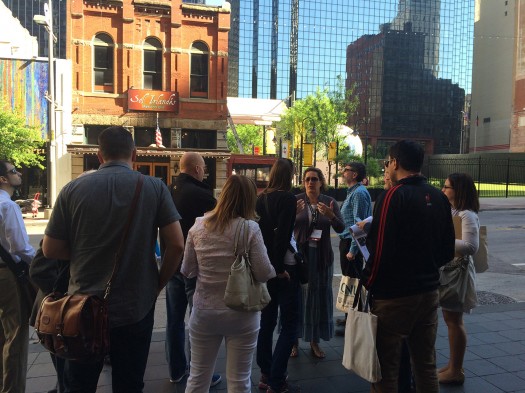Experience
PlaceMakers’ Intrepid Inside-Baseball Highlight Reel from CNU23
Having just wrapped up what may have been our favorite CNU ever, in Dallas on April 29 through May 2, we want to share some of the ideas that resonated the most with us. The topics below are snippets of great insights from many voices, including the likes of Andrés Duany, Fort Worth Mayor Betsy…
Read MoreWe’re all complicit in change. So now what?
For reasons both mysterious and irrelevant, Citylab’s Facebook page promoted a two and a half year old post on bike theft this weekend. What proved interesting about it, at least to me, is that in explaining market demand for stolen bicycles, it referenced a study on how people perceive different types of crime — finding…
Read MoreHere’s to Zimmerman/Volk and to ‘Attainable Housing’
I should maybe feel at least a little guilty for escaping the cold weather in the North Carolina mountains where I live and heading to Florida over the weekend. But I don’t. The destination was, after all, Panhandle Florida, the vertically challenged part of Florida that folks farther south call “LA,” as in “Lower Alabama.”…
Read MoreThe Human Scale
This weekend, I again watched The Human Scale, a film from 2013, and got more stoked to meet Jan Gehl at the 23rd Congress for the New Urbanism (#CNU23) in Dallas in April. Jan will bring the Congress an update on his human scale work since the film was complete, but the ideas are timeless.…
Read MoreLetting Love Rule: All urban density is not created equal
Last week we resurrected a look at the preservation movement — asking if, rather than strict adherence to ideology, love of place could ultimately rule the day — so that, this week, we could put a spotlight on Kaid Benfield, the latest addition to the PlaceMakers team, and his thoughts on the issue’s flip-side. In…
Read MoreThis Just In: No one is everyone, no place is every place
Now that the recent economic unpleasantness is behind us, we can resume the suburbanization of everywhere. The Economist apparently thinks so, given its recent special section headlined “The World Is Becoming Ever More Suburban, and the Better for It.”
Read MoreBlack Friday: Get your gorilla on
We’re happy when we go for a run. We’re even more happy when we go for a run in a gorilla suit — at least according to Roko Belic, director of the award-winning documentary, HAPPY. That’s because some change is gonna do ya good. Which is one of the many reasons that we placemakers advocate for immersive…
Read MoreBerliner Kinder: Berlin and its playborhoods
You’ve heard my fellow Placeshaker, Scott Doyon, say Smart Growth = Smart Parenting. More than once, actually. As well as how living in a walkable neighbourhood may shape our children. I’ve also talked about how my winter city, Winnipeg, nurtures active kids, as well as put some of those ideas into a TEDxTalk. Last week,…
Read MoreWhat This Innocuous Piece of Plastic Says About Our Suburban Future
Okay. So here we are, out west, working on a county-level comprehensive plan. It’s a big county, which means that each day we meet in the lobby of our centrally-located hotel, then journey caravan-style out to one of the various communities we’re serving over the course of a week. Until we get where we’re going,…
Read MoreEuro-Envy Reconsidered: Talkin’ time, distance and change
When my wife and I headed to Europe for our first two-week vacation in 15 years, I don’t think I realized how grouchy I was getting about change adaptation in the US. So much political paralysis. So little leadership. No sense of urgency on issues of huge importance. It was way past time for a…
Read More

